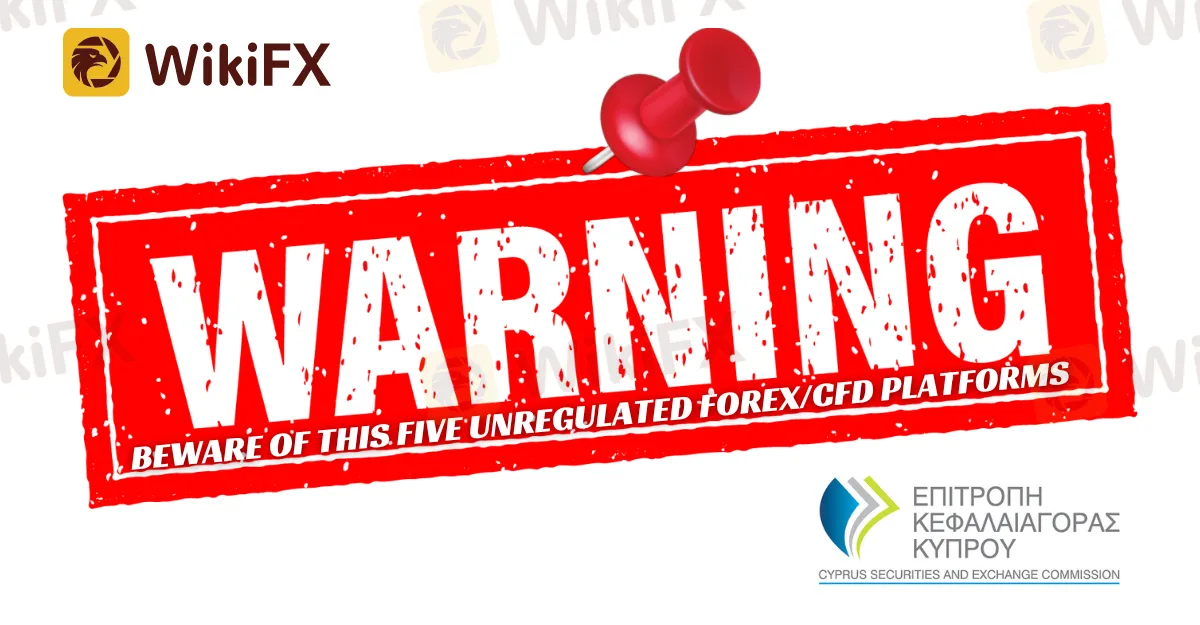简体中文
繁體中文
English
Pусский
日本語
ภาษาไทย
Tiếng Việt
Bahasa Indonesia
Español
हिन्दी
Filippiiniläinen
Français
Deutsch
Português
Türkçe
한국어
العربية
WikiFX Alert: CySEC Warns The Public To Avoid Five Unregulated Forex/CFD Platforms
Abstract:CySEC announced a list of unlicensed enterprises, including five unregulated websites. None of these organizations, according to the regulation, are Cypriot Investment Firms (CIFs).

Cyprus's financial regulatory body is CySEC (Cyprus Securities and Exchange Commission). It regulates and supervises the investment services market, which includes investment companies, stock exchanges, and other associated institutions. The primary goals of CySEC are to safeguard investors and maintain the smooth operation of Cyprus's securities markets. It also seeks to prevent money laundering and other financial crimes, as well as to promote financial market openness and integrity. Furthermore, CySEC is a member of the European Securities and Markets Authority (ESMA) and the International Organization of Securities Commissions (IOSCO), which enables regulatory bodies to collaborate and share information.
On Wednesday, CySEC (Cyprus Securities and Exchange Commission) announced a list of unlicensed enterprises, including five unregulated websites. None of these organizations, according to the regulation, are Cypriot Investment Firms (CIFs).
“The Cyprus Securities and Exchange Commission (‘CySEC’) wishes to inform investors that the following websites do not belong to an entity which has been granted authorization for the provision of investment services and/or the performance of investment activities, as provided for in Article 5 of Law 87 (I)/2017. said by the regulator.”
The list of warned entities includes:
Metexo.com
Inforexeu.com
Et-FX.com
Nbimarkets.net
EmporiumCapital.Ltd
The sites that have been warned by CySEC provide access to high-risk trading items such as forex, CFDs, cryptocurrencies, and other popular asset classes. Some also provide wealth management services as well as the chance to participate in the stock market. In certain circumstances, the leverage given surpasses the maximum levels permitted by existing European legislation.
Before doing business with investment companies, investors should examine CySEC's website (www.cysec.gov.cy) to determine whether businesses are licensed to offer investment services and/or investment activities.
On behalf of CySEC, WikiFX may also assist investors in locating unlawful enterprises. WikiFX lists over 42,000 brokers, both regulated and unregulated. Simply type the broker's name into the search field, and as a result, it will provide the regulatory status of your selected broker.
As an example,

Keep an eye out for additional unregulated forex brokers.
Install the WikiFX App on your smartphone to keep up to speed on current events.

Disclaimer:
The views in this article only represent the author's personal views, and do not constitute investment advice on this platform. This platform does not guarantee the accuracy, completeness and timeliness of the information in the article, and will not be liable for any loss caused by the use of or reliance on the information in the article.
Read more

How to Know if the Market is Correcting or Reversing?
In trading, distinguishing between a market correction and a market reversal is crucial for making sound decisions. Misjudging one for the other can lead to missed opportunities or significant losses. While both involve price movements, their causes, duration, and implications differ substantially. Understanding these differences can help traders improve their strategies and adapt to market conditions effectively.

RM62k Lost Investment Scam After Joining XRP Community Malaysia on Telegram
A 30-year-old homestay manager from Chendering, Malaysia, fell victim to an online bitcoin investment scam, losing RM62,214.59. According to Kuala Terengganu police chief ACP Azli Mohd Noor, the incident unfolded after the victim joined a Telegram group named “XRP Community Malaysia” on December 19. The group promoted bitcoin investments allegedly powered by Artificial Intelligence (AI).

Russia Turns to Bitcoin for International Trade Amid Sanctions
Russian companies are increasingly using Bitcoin and other cryptocurrencies to bypass Western sanctions and facilitate international trade. The country's Finance Minister, Anton Siluanov, confirmed that cryptocurrencies mined in Russia are now being employed for foreign transactions under an experimental framework.

Victims of Financial Fraud in France Suffer Annual Losses of at Least €500 Million
Financial fraud in France is becoming increasingly diverse, with reports indicating that victims incur annual losses of at least €500 million.
WikiFX Broker
Latest News
Russia to Fully Ban Crypto Mining in 10 Regions Starting January 1, 2025
Why is there so much exposure against PrimeX Capital?
Two Californians Indicted for $22 Million Crypto and NFT Fraud
RM62k Lost Investment Scam After Joining XRP Community Malaysia on Telegram
Victims of Financial Fraud in France Suffer Annual Losses of at Least €500 Million
WikiFX Review: Is Ultima Markets Legit?
Colorado Duo Accused of $8M Investment Fraud Scheme
What Impact Does Japan’s Positive Output Gap Have on the Yen?
Macro Markets: Is It Worth Your Investment?
Malaysia Pioneers Zakat Payments with Cryptocurrencies
Currency Calculator


